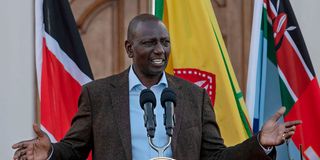Commodities exchange could stimulate the economy

President William Ruto. The passion and conviction with which the President articulated his government’s strategy to market access is indeed a breath of fresh air.
In his recent live television interview, President William Ruto announced his government’s plan to set up a Commodities Exchange in order to streamline the marketing of agricultural commodities.
Once set up, it will fulfil one of his party’s manifesto promises “to make markets work for everyone”. We should hope that his remarks are speedily followed up by the establishment of instruments to set up the exchange.
A Commodities Exchange has the capacity to trigger a multiplier effect across several value chains. An African Development Bank guidebook on setting up such exchanges explains that in agricultural contracts, for example, farmers get greater flexibility to better plan their operations, agro-processors can reduce the impact of price fluctuations on their processing margins, traders can enhance their procurement and better manage their risks, banks will find lending to each of these groups much safer, and government entities can buy and sell more easily and more transparently.
A futures exchange can allow farmers and their service providers to operate in a free marketplace without having to rely on government guarantees or subsidies. It will allow Kenya — and indeed other African countries — to realise their potential as agricultural exporters, and help avoid costly market interventions. It will definitely improve the predictability of agricultural prices and enhance food security.
Prevailing conditions in the country certainly favour the creation of such an exchange. There is a large underlying physical market potential, prices are volatile and farmers still face challenges accessing finance because of perceived high risks. On the plus side, payment systems have vastly improved especially on the technology front and market players are plentiful.
Many farmers are now able to use their smartphones to learn how to use a commodities exchange properly, without the hassle of travelling over long distances to a physical exchange.
Although talk about setting up an exchange is not new in Kenya — it was mooted more than 10 years ago — there does not seem to have been sufficient motivation on the part of past governments to create an enabling environment for the right type of exchange to operate successfully. In Africa, examples of functional commodities exchanges are in South Africa, Ethiopia, Nigeria, Morocco and Ghana.
President Ruto’s government will have to be very clear on the approach it takes to set up a commodities exchange to pre-empt the jostling for territory and authority that often attends such efforts. Politics and selfish interests must be shut out to create a licensed and regulated marketplace where buyers and sellers meet to trade in commodities and where contracts are honoured and enforceable.
Unfettered environment
While the Capital Markets Authority can remain the regulator, the exchange must be allowed to operate in an unfettered environment. The government must resist the urge to set up an entity along the lines of a parastatal because of the risks associated with the government taking a strong hands-on role in the development and management of exchanges.
Some of the risks include a strong reliance on consultants who do not necessarily have a broad experience in commodity exchange development. They will give wrong advice, leading to a waste of time and resources.
Governments also tend to be slow, taking years rather than months that a private-led initiative would need to establish an exchange. Governments may look at an exchange as a public service, undermining its capacity to make the commercial choices necessary for the exchange to gain the trust of users. There is also the need to think through the need to leverage technology and cross-border participation in the exchange, factors that support a more private-led, rather than government-led initiative.
But a commodity exchange cannot function in the face of a hostile government. Supportive governments will more likely remove the barriers that are generally created by different ministries (trade policies, taxes, market interventions and infrastructure i.e. warehouses needed for storage).
An ideal approach is one that allows the private sector to lead the process of creating and managing a commodities exchange with firm support from the government.
The passion and conviction with which the President articulated his government’s strategy to market access is indeed a breath of fresh air. It is also opportune. Barring a climatic disaster, there are signs that harvests this year will be substantial. There is no better time to accelerate the process of setting up a commodities exchange in time to help farmers market their next harvest.
The President must move from words to action and establish the framework that gives the private sector the lead to accelerate this process. The market players and indeed the Capital Markets are awaiting with bated breath as this will be a much-needed stimulant to the economy.
Mr Mshindi, a former editor-in-chief of Nation Media Group, is now consulting. [email protected]; @TMshindi)





